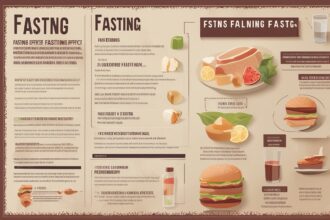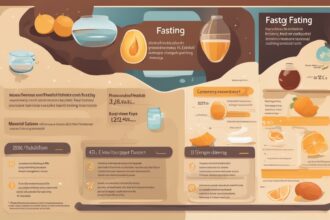Hey there, fellow wellness seekers! If you’ve been diving into the world of health fasting, you’ve probably heard about its potential benefits—weight loss, improved mental clarity, and even better metabolic health. But let’s get real for a moment: fasting isn’t all sunshine and rainbows. Like any lifestyle change, it comes with its fair share of side effects, especially if you’re new to it or pushing your limits. In this post, we’re going to unpack the most common fasting side effects, dive into the science behind why they happen, and share practical tips to help you navigate them. Whether you’re trying intermittent fasting, water fasting, or another fasting method, stick with me to learn how to make the journey smoother and safer.
What Is Health Fasting and Why Do Side Effects Happen?
Before we jump into the nitty-gritty, let’s clarify what health fasting means. Fasting is the voluntary abstinence from food and sometimes drink for a specific period, often for health, spiritual, or weight management reasons. Popular methods include intermittent fasting (like the 16/8 method, where you fast for 16 hours and eat during an 8-hour window) and extended fasting (going without food for 24 hours or more). While fasting can trigger positive changes like improved insulin sensitivity and autophagy (cellular cleanup) (Mattson et al., 2017), it also puts stress on your body as it adapts to a lack of immediate energy sources. This stress is often the root cause of side effects, especially during the initial stages when your body is switching from burning glucose to fat for fuel—a process called ketosis. So, let’s explore what you might experience.
Common Side Effects of Health Fasting
When you start fasting, your body doesn’t always roll with the punches right away. Here are some of the most common side effects people report when embarking on a fasting health journey. Knowing what to expect can help you prepare mentally and physically.
- Hunger and Cravings: This one’s a no-brainer. When you’re not eating, your stomach might growl, and your brain might scream for a snack. This happens due to spikes in ghrelin, the hunger hormone (Cummings et al., 2002).
- Fatigue and Low Energy: Without a steady stream of calories, especially carbs, your energy levels can dip as your body adjusts to using stored fat for fuel.
- Headaches: Dehydration, low blood sugar, or caffeine withdrawal (if you’re cutting coffee) can trigger headaches during fasting (Torelli et al., 2010).
- Irritability: Ever heard of being “hangry”? fasting can mess with your mood, partly due to fluctuating blood sugar levels.
- Digestive Issues: Some people experience bloating or constipation when they resume eating after a fast, as the digestive system recalibrates.
The Science Behind Fasting Side Effects
Let’s geek out for a minute on why these side effects happen during health fasting practices. When you stop eating, your body’s primary energy source—glucose from carbs—starts to run low. After about 12–16 hours, depending on your activity level and metabolism, your liver’s glycogen stores deplete, and your body begins breaking down fat into ketones for energy (Anton et al., 2018). This transition isn’t always seamless. The initial drop in blood sugar can cause fatigue, irritability, and headaches. Dehydration, often overlooked during fasting, exacerbates these issues since water is crucial for nearly every bodily function (Institute of Medicine, 2005). Plus, if you’re doing a prolonged fast, electrolyte imbalances—think low sodium or potassium—can lead to muscle cramps or dizziness. Understanding these mechanisms helps us see that side effects aren’t just annoyances; they’re signs your body is adapting to a new normal.
Who’s Most at Risk for Fasting Side Effects?
Not everyone experiences fasting side effects the same way. If you’re new to healthy fasting routines, your body might take longer to adjust compared to a seasoned faster. People with pre-existing conditions like diabetes or low blood pressure should be extra cautious, as fasting can cause dangerous drops in blood sugar or exacerbate symptoms (Furmli et al., 2018). Women may also notice more pronounced effects due to hormonal fluctuations—some report increased irritability or disrupted menstrual cycles during fasting. If you’re on medication or have a history of eating disorders, consulting a healthcare provider before starting a fasting regimen is non-negotiable. The key takeaway? Fasting isn’t one-size-fits-all, and knowing your body’s limits is crucial.
Tips to Minimize Side Effects During Health Fasting
Now that we’ve covered the “what” and “why” of fasting side effects, let’s talk about the “how”—as in, how to manage them. With a few practical tweaks, you can make your fasting for health experience much more bearable. Here are some tried-and-true strategies I’ve picked up from personal experimentation and expert advice.
- Start Slow: If you’re new to fasting, don’t jump into a 3-day water fast. Begin with a shorter window, like 12/12 (12 hours fasting, 12 hours eating), and gradually increase the fasting duration.
- Stay Hydrated: Drink plenty of water—aim for at least 8–10 cups daily during fasting periods. Add a pinch of salt or an electrolyte supplement if you’re on a longer fast to prevent imbalances.
- Break Your Fast Gently: Avoid heavy, greasy meals right after fasting. Start with light foods like broth, yogurt, or fruit to ease your digestive system back into action.
- Listen to Your Body: If you feel dizzy or overly fatigued, don’t push through. Breaking a fast early is better than risking your health.
Remember, preparation is everything. Stock up on hydration essentials and plan your fasting schedule around low-stress days if possible. I’ve found that fasting during a busy workweek can amplify irritability, so timing matters!
When to Stop Fasting and Seek Help
While most side effects of health fasting are temporary and manageable, there are red flags you shouldn’t ignore. Fasting is meant to support wellness, not harm you. If you experience severe dizziness, fainting, chest pain, or extreme weakness, stop fasting immediately and seek medical attention. Persistent headaches or confusion could signal dehydration or electrolyte issues, which can be serious if left unchecked (World Health Organization, 2020). Also, if fasting triggers unhealthy thoughts about food or body image, it’s time to reassess whether this practice is right for you. I can’t stress this enough: your mental and physical health always come first. Chat with a doctor or dietitian if you’re unsure about continuing, especially if side effects linger beyond a few days of starting a new fasting routine.
In wrapping up, navigating the side effects of health fasting doesn’t have to be a daunting task. Yes, you might feel hungry, tired, or a bit cranky at first, but with the right mindset and strategies, you can minimize discomfort and maximize the benefits of your fasting journey. Remember to start slow, stay hydrated, and listen to your body’s signals. Fasting can be a powerful tool for wellness, but it’s not a race or a one-size-fits-all solution. Have you tried fasting before? What side effects did you notice, and how did you handle them? Drop a comment below—I’d love to hear your story and swap tips. Let’s keep learning and growing on this path to better health together!
References
- Anton, S. D., Moehl, K., Donahoo, W. T., Marosi, K., Lee, S. A., Mainous, A. G., … & Mattson, M. P. (2018). Flipping the metabolic switch: Understanding and applying the health benefits of fasting. Obesity, 26(2), 254–268. https://doi.org/10.1002/oby.22065
- Cummings, D. E., Purnell, J. Q., Frayo, R. S., Schmidova, K., Wisse, B. E., & Weigle, D. S. (2002). A preprandial rise in plasma ghrelin levels suggests a role in meal initiation in humans. Diabetes, 51(8), 1714–1719. https://doi.org/10.2337/diabetes.51.6.1714
- BMJ Case Reports, 2018, bcr-2017-221854. https://doi.org/10.1136/bcr-2017-221854
- Institute of Medicine. (2005). Dietary Reference Intakes for Water, Potassium, Sodium, Chloride, and Sulfate. National Academies Press. https://doi.org/10.17226/10925
- Mattson, M. P., Longo, V. D., & Harvie, M. (2017). Impact of intermittent fasting on health and disease processes. Ageing Research Reviews, 39, 46–58. https://doi.org/10.1016/j.arr.2016.10.005
- Torelli, P., Evangelista, A., & Bini, A. (2010). Fasting headache: A review of the literature and new observations. Headache: The Journal of Head and Face Pain, 50(5), 958–964. https://doi.org/10.1111/j.1526-4610.2009.01581.x
- World Health Organization. (2020). Dehydration and electrolyte imbalance: Guidelines for prevention and treatment. WHO Press. https://www.who.int/publications






